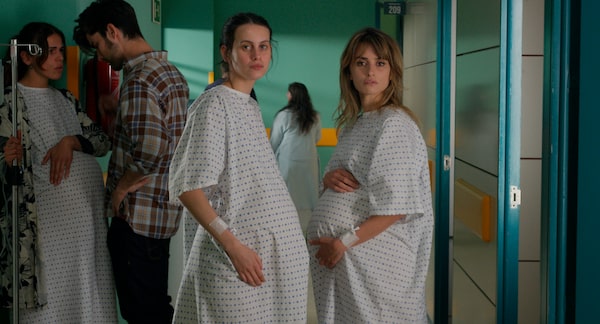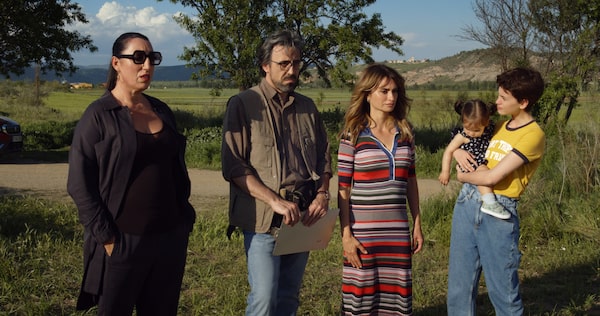
Milena Smit, left, as Ana, and Penélope Cruz as Janis in Parallel Mothers.Iglesias Más/Courtesy of Sony Pictures Classics / Mongrel Media
Plan your screen time with the weekly What to Watch newsletter. Sign up today.
Parallel Mothers
Written and directed by Pedro Almodóvar
Starring Penelope Cruz, Milena Smit and Rossy de Palma
Classification R; 123 minutes
Opens Feb. 11 in Toronto, Montreal and Vancouver theatres
Critic’s Pick
Pedro Almodóvar just about saved my soul. During the height of yet another Ontario lockdown – schools closed, cinemas and restaurants shut down, a whiff of god-not-this-again hanging thick in the winter air – I received a screening link to the Spanish filmmaker’s latest work, which was initially set to open in Canadian theatres at the beginning of the new year. (It’s finally making its way here this weekend.)
I was both fairly sure what Parallel Mothers might be, and eager to be surprised. Thankfully, Almodóvar delivers on both fronts – as Almodóvar should almost always be entrusted to do. Part tear-stained Technicolor melodrama and part furious cultural excavation, Parallel Mothers rests somewhere near the mid- to upper-tier of Peak Almodóvar. There are slight, barely perceivable cracks in its foundations, but mostly this is rock-solid cinema that will give you renewed life. It is all the more impressive given that it arrives from a filmmaker who, nearly five decades in the game, remains at the height of his powers.
Indeed, there is a sense of career-long catharsis watching Parallel Mothers, as if the filmmaker has been patiently waiting to tell this particular story since he first picked up a camera. (There is physical evidence to prove this theory half-true: a fictional poster for the movie appears in the background of his 2009 film Broken Embraces.)

As the title implies, Parallel Mothers tells two tales concurrently.Iglesias Más/Courtesy of Sony Pictures Classics / Mongrel Media
Certainly, there are familiar Almodóvar-isms: desperate women, twists of fate, and an unceasing fascination with mothers, mothers, mothers. But for the first time in the director’s filmography – work that was birthed in the hedonistic heyday of La Movida (“The Happening”) that followed Francisco Franco’s death – Almodóvar is directly confronting the chaos of the Spanish Civil War, and the shadow it continues to cast over his country’s psyche.
As the title implies, Parallel Mothers tells two tales concurrently. The first involves photographer Janis (Penélope Cruz), who befriends the teenage Ana (Milena Smit) in the hospital while they both await the deliveries of their first-borns. Years later, Janis and Ana reconnect, but only after tragedy has struck both women.
While this drama, tinged with elements of both black comedy and psycho-sexual thriller, plays out, Almodóvar keeps returning to Janis’s long-held quest to unearth the remains of her great-grandfather, who was “disappeared” by Franco-affiliated rebels. Eventually, a story about motherhood becomes a story about cultural memory, with Almodóvar gleefully but respectfully mixing the themes together until they coalesce into one singular treatise on the responsibility we have to recognize, and never forget, our own mistakes.

Milena Smit, left, as Ana, and Aitana Sánchez-Gijón as Teresa in Parallel Mothers.Iglesias Más/Courtesy of Sony Pictures Classics / Mongrel Media
Throughout Parallel Mothers, Almodóvar runs the risk of derailing his drama by insisting to keep Spain’s painful history at the forefront. Does he want audiences to become lost in one of his signature melodramas – set-designed with eye-popping detail and acted with red-hot intensity by a cast of regular collaborators – or does he want to shake his countrymen from what he views as a sort of societal amnesia? Both, actually, and somehow he pulls the balancing act off.
There is even a moment mid-film in which he addresses the tension that he himself created, with Ana confronting Janis over her obsession with finding the bones of a man who’s been dead for decades. “You have to look at the future,” Ana says, “otherwise you’ll just open old wounds!” The thing is, opening old wounds – albeit of the personal, not societal, nature – has been Almodóvar’s specialty forever.

Left to right: Rossy de Palma as Elena, Israel Elejalde as Arturo, Penélope Cruz as Janis and Milena Smit as Ana in Parallel Mothers.Iglesias Más/Courtesy of Sony Pictures Classics / Mongrel Media
Cruz, whose presence here marks her seventh time working with Almodóvar, goes beyond typical excellence. As Janis confronts traumas both contemporary and historical, the actress must portray both victim and crusader, all without falling to pieces. It is a remarkable performance that should live in the hall of Almodóvar’s many great women on the verge of a nervous breakdown. Relative newcomer Smit, meanwhile, acquits herself well as the fragile Ana, especially given that she must face off against a cadre of Almodóvar’s favourite actresses (not only Cruz, but also regulars Rossy de Palma and Julieta Serrano).
Toward the film’s end, when Janis and Ana stare directly at the histories of their own shared lives and the history of their country, Parallel Mothers’ twin purposes merge into something just shy of profound. It is a moment, and movie, that just might save your soul, too.
Sign up for The Globe’s arts and lifestyle newsletters for more news, columns and advice in your inbox.
 Barry Hertz
Barry Hertz